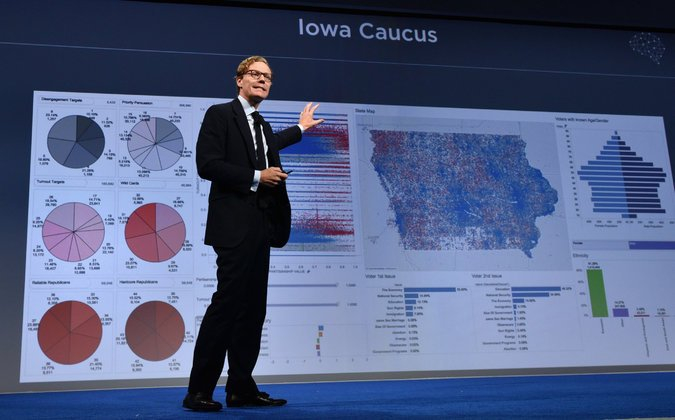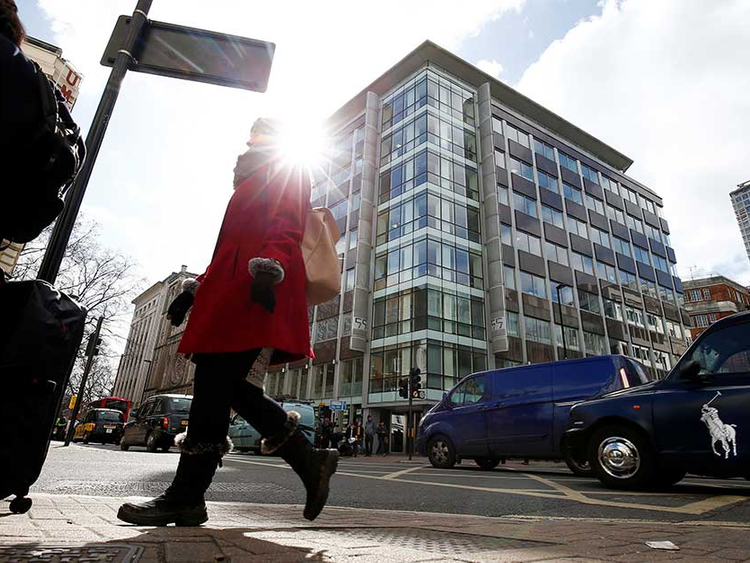
London: Cambridge Analytica conducted data research for one of the leading Brexit campaign groups — and then misled the public and MPs over the work the company had undertaken, according to a former employee who has spoken to the Guardian.
In an exclusive interview, Brittany Kaiser, Cambridge Analytica’s business development director until two weeks ago, said the work with Leave.EU involved analysis of data provided by Ukip.
Emails and other documents, seen by the Guardian, show the company was worried about whether it could speak openly about the “interesting findings” and the origins of the data that had been analysed.
It decided against doing so.
Kaiser, 30, said the work took a number of weeks and involved “at least six or seven meetings” with senior officials from Leave.EU, which was co-founded by Arron Banks, a Ukip donor. She said the work took place as part of an effort to secure formal business with the campaign group.
Kaiser said she felt she had lied by supporting Cambridge Analytica’s company line that it had done “no paid or unpaid work” for Leave.EU. “In my opinion, I was lying,” she said. “In my opinion I felt like we should say, ‘this is exactly what we did’.”
Q&A
How did the Cambridge Analytica story unfold?
Saturday 17 March
The Observer publishes online its first story on the Facebook and Cambridge Analytica scandal, written by Carole Cadwalladr and Emma Graham-Harrison.
Former Cambridge Analytica employee Christopher Wylie reveals how the firm used personal information taken in early 2014 to build a system that could profile individual US voters.
The data was collected through an app, built by academic Aleksandr Kogan, separately from his work at Cambridge University, through his company Global Science Research (GSR).
Sunday 18 March
As the Observer publishes its full interview with Wylie in the print edition, the fallout begins. US congressional investigators call for Cambridge Analytica boss Alexander Nix to testify again before their committee.
Monday 19 March
Channel 4 News airs the findings of an undercover investigation where Cambridge Analytica executives boast of using honey traps, fake news campaigns and operations with ex-spies to swing election campaigns.
Tuesday 20 March
A former Facebook employee claims hundreds of millions of Facebook users may have had their private information harvested by companies in similar methods.
Wednesday 21 March
UK MPs summon Mark Zuckerberg to appear before a select committee investigating fake news, and accuse Facebook of misleading them at a previous hearing.
Thursday 22 March
It emerges Facebook had previously provided Kogan with an anonymised, aggregate dataset of 57bn Facebook friendships. Zuckerberg breaks his silence to call the misuse of data a 'breach of trust'.
Friday 23 March
Brittany Kaiser, formerly Cambridge Analytica’s business development director, reveals the blueprint for how CA claimed to have won the White House for Donald Trump by using Google, Snapchat, Twitter, Facebook and YouTube.
Under investigation
Kaiser’s revelations will reignite a fierce argument about the tactics used to try to influence voters in the Brexit campaign – and will add to the pressure on Alexander Nix, the CEO of Cambridge Analytica.
The company is already under investigation by the Electoral Commission over what role, if any, it played in the EU referendum campaign.
Banks said: “Leave.EU did not receive any data or work from Cambridge Analytica. Ukip did give Cambridge Analytica some of its data and Cambridge Analytica did some analysis of this.
But it was not used in the Brexit campaign. Cambridge Analytica tried to make me pay for that work but I refused. It had nothing to do with us.”
Nix has repeatedly denied there was any involvement, telling MPs last month: “Let me be absolutely crystal clear about this. I do not know how many ways I can say this. We did not work for Leave.EU. We have not undertaken any paid or unpaid work for them, OK?”
His testimony appears to be challenged by Kaiser, who was a senior employee at the company until she left following a contractual dispute earlier this month.
Proprietary data
She admitted Leave.EU did not pay for the work but described how the relationship between them began in the autumn of 2015 when she visited the offices of Leave.EU and Ukip.
She said both organisations offered to share proprietary data with Cambridge Analytica’s lead scientist, David Wilkinson.
He requested access to Facebook pages, “subscriber, donation and local group data”, email engagement and call centre records. It is not clear what information they had – or what was passed over.
But Kaiser says the most fruitful work was conducted on data stored on a Ukip computer that was carried into Cambridge Analytica’s London office.
“Ukip had undertaken a survey on why people wanted to leave the EU or not, and they also had membership data. So we were able to build personas out of that. That was work that would normally be paid for.”
Kaiser said she briefed senior Leave.EU officials on the results of the research, but that the campaign never received a final report because it unexpectedly backed out of a contract.
Banks said that this work was not used in the Brexit campaign and was not connected to Leave.EU.
On 21 April 2017, the Electoral Commission launched its first investigation into Leave.EU, looking specifically at “whether one or more donations – including of services – accepted by Leave.EU was impermissible; and whether Leave.EU’s spending return was complete”.
Nix sent an email to Kaiser and other executives at 3.37am the following morning, arguing the company had “nothing to worry about” from the Electoral Commission and that the “narrative” should be that “we did not end up working together”.
He wrote: “Whilst there is no law against ‘lying’, I think that we need to establish the narrative that precipitated these two admissions, such that we can mitigate loss of credibility … both the press release and Brittany’s comments [at the Leave.EU launch] indicate that CA had already completed work for the campaign.”
He went on to express concern that “it might be argued that we contributed to the campaign in the form of ‘goodwill’”.
“When I first found out that we were going to say that we did zero work on it, I felt betrayed and lied to,” said Kaiser. “Because I was continually told I could go along with the narrative that we did work on it.”
Lying
She added: “I was like: the narrative should be that the work that we did was never paid for so Leave.EU, by not registering that we did that work, are the ones that should be in trouble. Not us for lying for their a****. Literally why should we make excuses for these people? Why? I’m so tired of making excuses for old white men.”
Since then Nix has repeatedly maintained that Cambridge Analytica did “no paid or unpaid work” for Leave.EU.
According to Kaiser, that does not tell the full story.
“The proposal was to do what we do for any other campaign in the world, which was to undertake a data audit. We do research for you, we build models, and then we help you execute that database through digital, direct mail, door-knocking, events, whatever.”
Kaiser said that the full proposal included two phases of work, and only the first was ever carried out. She claims she presented this initial data work 15 members of the Leave.EU campaign team in a briefing meeting, but did not supply them with the usual final report as no payment was ever made.
However, she estimated the data modelling work done by Cambridge Analytica for Leave.EU and Ukip in the run-up to the referendum was worth around £40,000.
Former Cambridge Analytica exec says she wants lies to stop
Read more
In particular, the firm was concerned about “the origins of the data we have analysed”, and whether it could declare it had looked at Ukip membership and survey data.
In the end, no details about the Ukip data study were made public, but Kaiser sat alongside leading members of Leave.EUfor its official launch in central London.
In the following weeks Kaiser said she personally advised Leave.EU campaigners in offices in London and Bristol.
“I sat with their social media person, worked through what they did; that’s all, in my opinion, invaluable advice, and in my opinion actual work that was undertaken although no one wants to hear that because it was never ever paid for – doesn’t mean that my time wasn’t given.”
Kaiser said she still feels Cambridge Analytica’s insistence it had undertaken no work for Leave.EU was “disingenuous”.
Suspended
Nix, who the firm suspended earlier this week, has said the claim that Cambridge Analytica was involved in the referendum was fake news.
He has blamed this on the “erroneous” publication of an article in Campaign magazine, attributed to him, which said that “Cambridge Analytica has teamed up with Leave.EU.
“The moment that that statement went out,” Nix told MPs last month, “we were absolutely crystal clear to all the media outlets that we weren’t involved, that it had been released in error, and we tried to correct the press again and again and again.”
A UKIP spokesman said Cambridge Analytica saw UKIP membership data - but nothing else. “Cambridge Analytica pitched to us, no data changed hands, and the invoice was rejected unpaid as there was no commercial relationship between UKIP and Cambridge Analytica.”
The Electoral Commission said its inquiry into Leave.EU was ongoing.
Brazilian prosecutors to investigate Cambridge Analytica
Brazil has world's third largest number of Facebook users and growing concern with fake news ahead of elections
SAO PAULO (AP): Federal prosecutors in Latin America's biggest country announced Thursday that they are investigating to determine if Cambridge Analytica illegally used the profiles of millions of Brazilian Facebook users.
Prosecutors the investigation was prompted by reports that the London-based political consulting firm had access to the personal information of 50 million Facebook users in the United States and could create voter personality profiles.
They said in a statement they want to find out if Cambridge Analytica, in partnership with local consultancy A Ponte Estrategia Planejamento e Pesquisa, also did the same thing in Brazil before the country's October elections.
Prosecutors said the partnership between both consulting firms began in 2017.
The Brazilian company said in a statement that it was never involved in the creation of such profiles and ended its relationship with Cambridge Analytica earlier this month.
"We are investigating if Cambridge Analytica is illegally using the personal data of millions of Brazilians to construct psychographic profiles to determine political and religious beliefs, sexual orientation, skin color, and political behavior," the prosecutors' statement said. "It is clear that the company's focus is to use this data to change people's behavior."
According to Statista, a Hamburg, Germany-based data and statistical company, Brazil has the world's third largest number of Facebook users as of January 2018. With 130 million Facebook users, Brazil comes behind India with 250 million and the United States with 230 million.
Facebook CEO Mark Zuckerberg has said his company has a responsibility to stop fake news that could affect elections.
"There's a big election in India this year, there's a big election in Brazil, there are big elections around the world, and you can bet that we are really committed to doing everything that we need to make sure that the integrity of those elections on Facebook is secured," he said in a Wednesday interview with CNN.
Fake news, including stories posted on Facebook, and their potential to interfere in the coming elections is a growing concern in Brazil.













